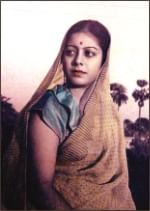<i>Kanan Devi: The first star of Bengali cinema</i>

A real life Cinderella story, Kanan Devi was among the early singing stars in undivided India. Her singing style, usually in rapid tempo, was behind some of the biggest hits of New Theatres.
Kanan Devi was born as Kanan Dasi in Howrah, West Bengal in or around 1916. In her autobiography, Kanan Devi has observed that she was born illegitimately. She belonged to a poor family and after the death of her adoptive father, she and her mother were left to earn and live on their own and had to do all sorts of work to drag on their lives.
Her name was soon changed to Kanan Bala. When she was only ten, a well-wisher introduced her to Jyoti Studios where she was cast in a small role in Joydev (1926). She later worked with Radha Films, in films mainly by Jyotish Banerjee. After being noticed in Khooni Kaun and Maa (1934), she entered New Theatres, Calcutta. She came in contact of maestro Raichand Boral who coached her and familiarised her in the Hindi accent. Thus started the journey of a remarkable woman whose life was no less than a fairy tale. From 'Kanan Bala' to 'Kanan Devi', the journey of this legendary actress and singer was fascinating.
Kanan got her first break in films as a lead actress with Jor Baraat (1931) directed by Jyotish Banerjee. She was only 15 then. P.C. Barua was unable to cast her in the role of Paro in Devdas (1935) but she played the lead in his Mukti (1937). An untrained singer when she stepped into the film-zone, Kanan trained briefly under Ustad Allah Rakha in Lucknow.
She was employed as a singer at Megaphone Gramophone Company, receiving further training from Bhishmadev Chatterjee. She later mastered Rabindra Sangeet with Anadi Dastidar. Mukti made Kanan a star and led to a fruitful association with the New Theatres.
The success of Bidyapati (Bangla) /Vidyapati (Hindi) (1937) in which she demonstrated perhaps her finest performance, propelled her to the crest of stardom. To quote critic Krishna Chaitanya, "Kanan Devi has the marvelous gift of smoothly carrying over to the melodic elaboration, the intimate expressiveness of speech -- occasional aspiration of vowels, accented speech rhythms and sensitive manipulation of volume." Kanan Devi remained the top star of New Theatre till she resigned in 1941 and began to freelance in Hindi and Bangla films.
Jawab, in the following year, saw perhaps her biggest ever hit song Toofan Mail, which is hummed by many to this date. Even though she was a singing sensation, music was secondary to the narration of a story. In fact powerful narrative appeal made up for most of the technical and other deficiencies Bangla cinema may have suffered from at the time and was a key to the success of the New Theatre Films.
Kanan Devi turned producer with Shrimati Pics in 1949 and launched the film Ananya. Her own productions were mainly based on Sarat Chandra's stories and were directed by her husband Haridas Bhattacharya. Kanan Devi's last film was Indranath Srikanta O Annadadidi (1959).
She wrote an autobiography Shobarey Ami Nomi (1973) and in 1977, Kanan Devi, the then considered 'first lady of Bangla Films' was awarded the Dadasaheb Phalke award for her contribution to Indian cinema. She also worked as President of the Mahila Shilpi Mahal, an organisation that helps aged and needy female artistes of yesteryears.
The legendary diva passed away on July 17, 1992 but her legacy remains alive in the heart of millions.
Compiled by Cultural Correspondent

 For all latest news, follow The Daily Star's Google News channel.
For all latest news, follow The Daily Star's Google News channel. 



Comments